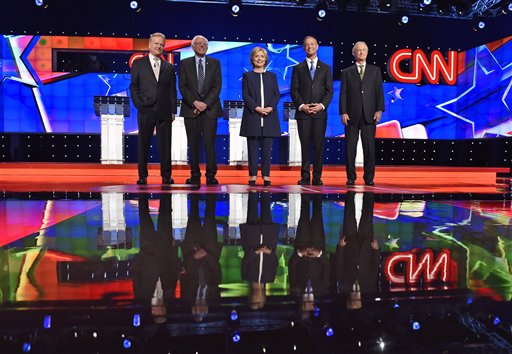
By Theresa Schliep
Five candidates took the stage on Tuesday, Oct. 13, in the first Democratic debate. Amidst the complaints about talking time, rhetorical ambiguity, there was discussion about platform and bipartisanship.
The debate began with the introduction of the candidates: former Rhode Island Governor Lincoln Chafee who became a Democrat in 2013, former Virginia Senator Jim Webb whose main talking point was his service as a marine in the Vietnam War, former Maryland Governor Martin O’Malley, who struggles with overcoming the association of his governorship with police brutality in Baltimore, and senator from Vermont Bernie Sanders, whose democratic socialism has proved popular with millennials; and former Secretary of State Hillary Clinton, the front runner whose popularity has been wavering due to her email scandals and the Benghazi incidents.
The presence of Lincoln Chafee, Jim Webb and Martin O’Malley at the debate proved to be confusing.
Chafee was unable to sufficiently answer why he voted to repeal the Depression-era Glass-Steagall Act in 1999. Many economists argue that the repeal of this act, which separates commercial and investment banking, as the cause of the 2008 recession.
Webb was the only candidate on stage who has served in combat, and that was well-established. This credential ended up being one of his only talking points. This, compounded with his complaints about speaking time, hindered his performance.
O’Malley performed the best under the circumstances. The first time O’Malley spoke, viewers were reminded of the Baltimore riots following Freddie Gray’s murder and his state’s zero-tolerance policy that some claim caused the outbreak of violence and tension. After that, however, he was articulately illustrated his progressiveness.
But it was difficult to outshine the frontrunners. The two assumed stars — Sanders and Clinton — did not disappoint. Bernie Sander’s brand of liberalism, which encourages free public college education and denounces the super rich, has obtained the support of an astonishing amount of people. However appealing his plans are especially free college — one could argue they are pipe dreams.
President Obama was unable to bypass the gridlock in Congress to pass effective gun control even following the tragic mass shootings that plagued his presidency. The former senator is very trendy, but his effectiveness in office is questionable.
Hillary Clinton, on the other hand, encapsulates the modern liberal. However, her campaign has been assaulted with attacks from Republicans in efforts to denigrate her candidacy through sensationalizing her email scandal and questioning her honesty and credibility. Hillary Clinton’s past is questionable, especially considering her refusal to establish a position on the Keystone Pipeline until the week of the debate, her vagueness on her climate change plans and the Benghazi incidents.
However, Clinton is held to higher standards than her fellow candidates. While Donald Trump is still considered a viable option for the presidency despite making sexist, racist and classist comments, Clinton is bombarded with questions about her email scandals instead of her policy. One might argue that it is because of her experience. Someone who has been Secretary of State, First Lady of the United States, and a senator should be competent enough to handle the scandals that have tormented her. Others might argue that because she is a woman, she needs to demonstrate her abilities perfectly. She must compensate for her “femininity” with stoicity and strength. Clinton’s victories must be overwhelming for them to be impressive.
Regardless the reason behind such lofty standards, one cannot argue that Clinton did not fulfill them. She refused to answer questions about her email scandal. In response to O’Malley’s criticism of her influence on the Iraq war, Clinton thanked him for his support in her 2008 presidential campaign.
When compared with Sanders’ progressiveness, Clinton responds, “I’m a progressive. But I’m a progressive who likes to get things done.”
Perhaps most reassuring about the debate was the stark contrast between the Democratic and Republican rhetoric. As O’Malley said in his closing statement, there was no denigration of women, racist attacks on immigrants or Islamaphobia. But if these are the standards we have for our debates, then our political integrity is crumbling.
Theresa Schliep, FCRH’19, is undecided in her major from Point Pleasant Beach, New Jersey.










































































































































































































